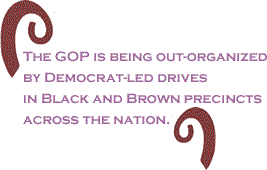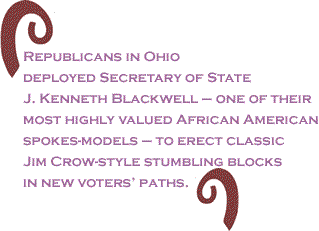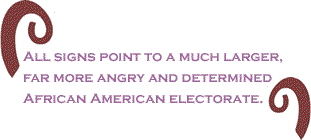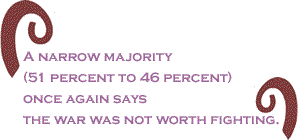
|
|||||||||||||||||||||
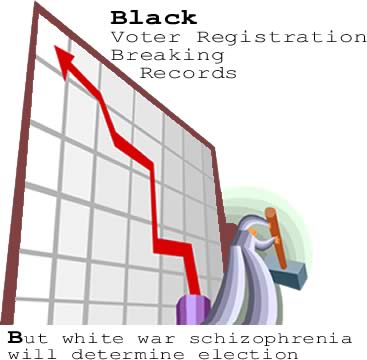 |
New voters are swelling the rolls and threatening to upset the assumptions of corporate pundits and polling organizations. Although Republicans are vigorously signing up white voters in the suburbs and exurbs, it appears the GOP is being out-organized by Democrat-led drives in Black and Brown precincts across the nation. According to a New York Times analysis, Democrat-affiliated groups “have added tens of thousands of new voters to the rolls in the swing states of Ohio and Florida, a surge that has far exceeded the efforts of Republicans in both states.” A review of county-by-county data shows “new registrations since January have risen 250 percent over the same period in 2000. In comparison, new registrations have increased just 25 percent in Republican areas. A similar pattern is apparent in Florida: in the strongest Democratic areas, the pace of new registration is 60 percent higher than in 2000, while it has risen just 12 percent in the heaviest Republican areas.” Massive voter sign-ups have overloaded registrars in many localities. The Associated Press national desk reports: “Clerks have hired extra workers in West Virginia, Ohio and Colorado. Philadelphia borrowed employees from other city agencies and started working overtime two months earlier than the usual post-Labor Day push.”
In Georgia, Atlanta registrars say they are “working overtime, six days a week right now." According to the Atlanta Journal-Constitution, “African-Americans, who generally support Democrats, are registering in high numbers. About 32 percent of newly registered voters through June are African-American. Overall, 26 percent of Georgia's registered voters are black.” Alarmed by Black registration fervor, Republicans in Ohio deployed Secretary of State J. Kenneth Blackwell – one of their most highly valued African American spokes-models – to erect classic Jim Crow-style stumbling blocks in new voters’ paths, including a requirement that voter registration cards be printed only on thick, 80-pound paper. (How many bubbles in a bar of soap? How many pounds in your paper?) People for the American Way, part of a coalition of 60 civil rights organizations, protested the “unduly burdensome and costly regulation that will slow the voter registration process, and even disenfranchise some voters at time of unprecedented new voter registration activity in Ohio.” So much for the argument that Blacks need to be strategically represented in both major political parties. (For an excellent overview of Republican dirty tricks, see “Bullies at the Voting Booth” in the October issue of The Progressive.)
This election cycle the Republicans have been more than matched by the sheer weight of Democratic field work funding – although key traditional Black constituency groups complain that they have been largely sidelined in favor of new outfits more closely tied to party leadership and white benefactors. Nevertheless, the cash flow has generated unprecedented results. The New York Times writes:
Although an averaging of the polls generally cited by the corporate media show Bush ahead by six points, the Zogby poll, which we believe does a far better job of assessing minority public opinion, puts the race much closer: a near dead-heat. What a deeper look at the polls tells us is that, barring an “October surprise” from either the Bush men or Osama bin Laden or disastrous economic news, the election will turn on events in Iraq. Iraqis hold the key
While giving Bush a “solid” lead, the Washington Post-ABC News poll shows Bush to be vulnerable to perceptions that U.S. casualties in Iraq are unacceptably high. (We are talking about white perceptions, here, since Black opinion is overwhelmingly anti-war and highly empathetic to Iraqi deaths as well as those of Americans – a hole in the souls of, particularly, white males. Latino opinion lies somewhere in between.) The Post-ABC survey found that:
Since the Post-ABC poll does not publish ethnic breakdowns, lopsided Black and Latino anti-war sentiment is buried in the aggregate data. Thus, a majority of whites still think the war in Iraq was “worth fighting,” but the negative numbers are strong and growing. By juxtaposing the Post-ABC poll with Rasmussen Report tracking results, which score the race 49-45 percent in Bush’s favor, we get a clearer window into the contradictions in (white) American thinking:
In the earlier survey, Rasmussen “found that most American voters believe it will take a lengthy period of time for Iraq to reach political stability. In fact, 60% of voters say it will take at least three years.” What we are seeing is a white public opinion that is substantially torn between the imperatives of American Manifest Destiny – the “mission” – and agony over the deaths of “our boys and girls” in Iraq. The threshold of acceptable pain is clearly much lower than during the Vietnam era. Steep increases in U.S. casualties in the weeks before November 2, or even a single event that is particularly costly to U.S. forces, would likely cause schizophrenic white American opinion to recoil from the war and abandon the “mission” in disgust. This should not be mistaken for empathy with Iraqis, but an unwillingness to expend too many American lives to “rescue” Muslims and Arabs from…other Muslims and Arabs.
The Bush Pirates are keenly aware of the volatility of the electorate regarding Iraq, and are doing everything possible to avoid setting a public mood swing in motion. That’s why U.S. forces have resorted to savage aerial attacks against resistance strongholds in Iraq, postponing infantry assaults on urban centers until after the election. That’s also why the Bush gang keeps blaming television news for giving a false impression of events on the ground, in a bald attempt to encourage further media self-censorship in Iraq. Iraqis, then, hold the U.S. election in their hands. Militarily and politically, it is the Iraqi resistance, not American war planners and politicians, who have the ability to decisively influence events. Americans are not the center of the world. The surge of new Black and Brown voters is encouraging news, and we are all anxious to see if John Kerry can dance on top of the very narrow table he has jumped on, during the debates. But Iraqis may have the final word. |
| September30 2004 Issue 107 |
|||||||||
|
|||||||||
|
|
|||||||||
| Printer Friendly Version | |||||||||
 |
|||||||||
 |
|||||||||
 |
|||||||||
| |
|||||||||
| |
|||||||||





















